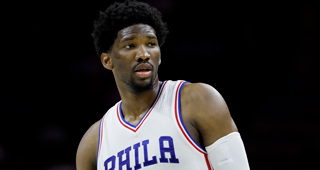Sports exist in a very odd cultural place in the United States in 2017. Twitter, which is not the real world but is definitely a real reflection of modern consciousness, fills with rage and musket blasts of information about a newly inaugurated president of unprecedented attitude and aims. The strange alien language occasionally punctuating this unending stream of ideology and calls to civic action comes from those accounts still earnestly focused on reporting on and analyzing what happens between oversized, overpaid men who fight over balls and baskets inside of brightly lit arenas. But while watching the NBA is a decidedly less joyous endeavor in a time of deep daily threats to the constitution, it remains relevant to who America is and will be.
The end of Donald Trump’s first week on the job forced fans of the Milwaukee Bucks and Los Angeles Lakers to think about this, and peer outside the bubble of sports for a moment, as politics invaded it. When the new president’s latest executive order—a ban on immigrants and refugees from a series of largely Muslim nations—it put players from each team in the crosshairs. Thon Maker and Luol Deng both hail from the Sudan, one of the nations on Trump’s condemned list. While the mostly nomadic Maker actually has, it turns out, an Australian passport, Deng’s travel status for his struggling young team will be in question as the nation battles with itself about Trump’s order, with the ACLU’s winning lawsuit for a temporary “stay” on the Muslim ban leading the way. A long series of legal showdowns between many gigantic institutions now lies ahead, and no one really knows what it means.
But it is important to note, as this crisis unfolds, that the NBA is increasingly a league of immigrants, with its latest batch of awe-inspiring young superstars standing as a particularly international bunch. While none of them are from the nations on Trump’s list, Joel Embiid (Cameroon), Kristaps Porzingis (Latvia), Nikola Jokic (Serbia), and Maker teammate Giannis Antetokounmpo (Greece) will head up an important vanguard of immigrant celebrity athletes. Willingly or not, foreign-born NBA players now lead a fraught and loaded existence, serving as examples of the distinct, inspiring excellence known when non-Americans become so fitted to national pastimes that they’re magnetized to our land.
Perhaps the most intriguing among these budding players is Embiid. While all of these young men are sensational, dominant athletes with historically unusual combinations of size and coordination, Embiid also happens to have a quite unique grasp on the more rhetorical aspects of American culture. Dating back to the summer of 2014, when he was drafted third overall by the Philadelphia 76ers despite an injury that would keep him off the court for his first two seasons, the seven-footer has sent unparalleled waves of hilarity across the internet. A series of social media posts made to court Rihanna gave him an aura of legend before he ever took a professional shot. More recently, after missing the Eastern Conference All-Star team by a hair, even though he had the fan votes to get him in, he made a tweet referencing the presidential election:
Once again the popular vote didn't matter......
— Joel Embiid (@JoelEmbiid) January 27, 2017
This brief sampling of Embiid’s comedic stylings is instructive: it often takes an outsider or an incomer to most poignantly describe to us how our country is working; to show us our deepest collective desires and absurdities. The ecstasy of immigrant influence is part of what makes America—a place with an always debatable level of greatness, to be sure—so often beautiful.
In the new angles and outlooks that he, Jokic, Antetokounmpo, and Porzingis provide on the floor we see, too, the persistence of our melting pot brilliance. Porzingis appears too svelte to function in a physical game, but his flashes of mean grace have restored the rare substance of basketball hope to the New York Knicks—he is so damn good that, even amidst a season so consistently disastrous that it would be discarded as a draft of sad fan fiction, he has made fans see shine in Madison Square Garden again. Antetokounmpo’s development into a legitimate MVP dark horse, at the age of 22, has made a future in which LeBron James doesn’t win the Eastern Conference by default much easier to envision. Jokic’s uncanny big man vision has re-routed the Denver Nuggets’ franchise; he also gave Team USA some of their biggest nightmares at August’s Olympics.
All of this is to say that the NBA, long the most progressive of our nation’s major sports leagues, thrives evermore when it embraces the growth of its game beyond borders, and that its future development stands very much in opposition to the protectionist policies of our new president. While the extent to which the league chooses to politicize itself in this polarizing moment remains to be seen, the trajectory of its spirit is one of the many things under attack in recent days. Among the many, many new strengthening tasks that Americans are beset with is the league’s duty to keep reminding us of how much better we are when our ethnic identity is fluid, not fixed.



